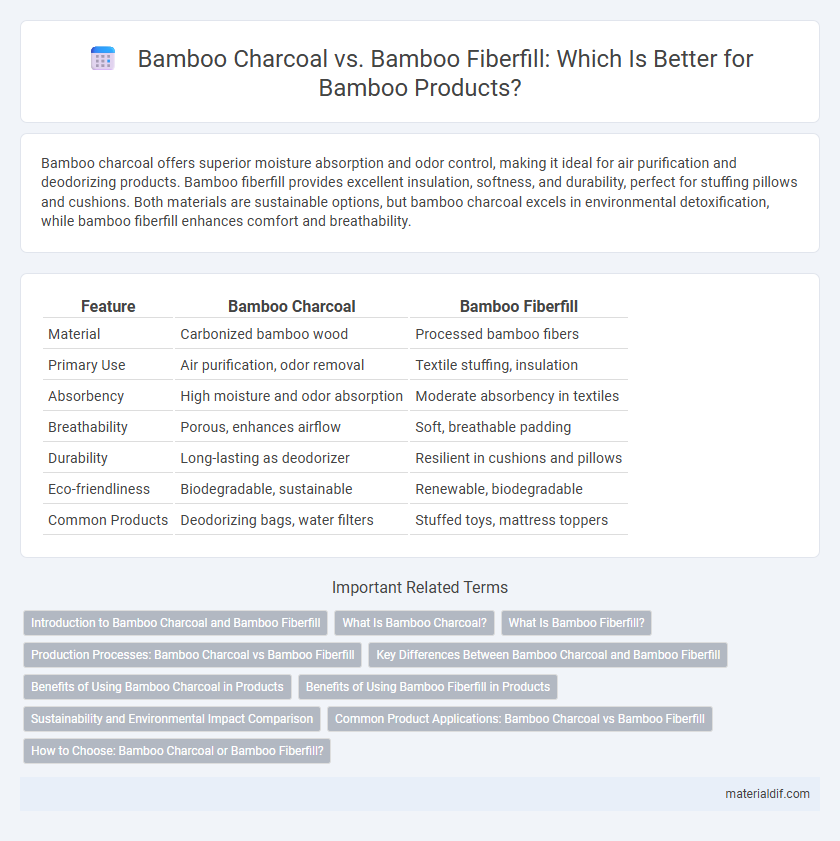Bamboo charcoal offers superior moisture absorption and odor control, making it ideal for air purification and deodorizing products. Bamboo fiberfill provides excellent insulation, softness, and durability, perfect for stuffing pillows and cushions. Both materials are sustainable options, but bamboo charcoal excels in environmental detoxification, while bamboo fiberfill enhances comfort and breathability.
Table of Comparison
| Feature | Bamboo Charcoal | Bamboo Fiberfill |
|---|---|---|
| Material | Carbonized bamboo wood | Processed bamboo fibers |
| Primary Use | Air purification, odor removal | Textile stuffing, insulation |
| Absorbency | High moisture and odor absorption | Moderate absorbency in textiles |
| Breathability | Porous, enhances airflow | Soft, breathable padding |
| Durability | Long-lasting as deodorizer | Resilient in cushions and pillows |
| Eco-friendliness | Biodegradable, sustainable | Renewable, biodegradable |
| Common Products | Deodorizing bags, water filters | Stuffed toys, mattress toppers |
Introduction to Bamboo Charcoal and Bamboo Fiberfill
Bamboo charcoal is produced by heating bamboo at high temperatures in a low-oxygen environment, creating a porous material known for its excellent moisture absorption, deodorizing, and antibacterial properties. Bamboo fiberfill, derived from the soft fibers of the bamboo plant, is widely used as an eco-friendly stuffing material for pillows, bedding, and cushions due to its natural breathability, durability, and hypoallergenic qualities. Both materials offer sustainable alternatives in textiles, with bamboo charcoal emphasizing purification and bamboo fiberfill enhancing comfort and support.
What Is Bamboo Charcoal?
Bamboo charcoal is a highly porous material produced by heating bamboo at high temperatures in a low-oxygen environment, resulting in a lightweight and highly absorbent substance. Renowned for its natural deodorizing, moisture-wicking, and antibacterial properties, bamboo charcoal is widely used in air and water purification, odor control, and skincare products. Unlike bamboo fiberfill, which is a soft, fluffy material made from processed bamboo fibers used mainly for insulation and cushioning, bamboo charcoal serves primarily as a natural purifier and moisture regulator.
What Is Bamboo Fiberfill?
Bamboo fiberfill is a natural, sustainable material derived from bamboo pulp, used primarily as a hypoallergenic stuffing in pillows, comforters, and cushions. Unlike bamboo charcoal, which is produced by heating bamboo in an oxygen-limited environment to create a porous substance for odor absorption and moisture control, bamboo fiberfill provides soft, breathable cushioning with excellent moisture-wicking properties. Its eco-friendly production and ability to regulate temperature make bamboo fiberfill a popular choice in bedding and upholstery products.
Production Processes: Bamboo Charcoal vs Bamboo Fiberfill
Bamboo charcoal is produced through a high-temperature carbonization process in which bamboo stalks are heated in an oxygen-limited environment to create porous, absorbent charcoal. Bamboo fiberfill, on the other hand, is made by mechanically processing bamboo pulp into fine, soft fibers that are combed and spun into a lightweight, breathable filling material. The distinct production methods result in bamboo charcoal being valued for odor absorption and moisture control, while bamboo fiberfill is prized for comfort and insulation in textiles.
Key Differences Between Bamboo Charcoal and Bamboo Fiberfill
Bamboo charcoal is a porous, highly absorbent material made by heating bamboo to high temperatures, known for its odor control, moisture absorption, and antimicrobial properties. Bamboo fiberfill, derived from the soft fibers of bamboo plants, is a lightweight, breathable, and sustainable synthetic filling used mainly in cushions and bedding for its hypoallergenic and moisture-wicking benefits. The key differences lie in their production processes and uses: bamboo charcoal excels in air purification and deodorizing, while bamboo fiberfill offers soft cushioning and thermal regulation.
Benefits of Using Bamboo Charcoal in Products
Bamboo charcoal offers superior odor absorption and moisture-wicking properties compared to bamboo fiberfill, making it an ideal material for air purifiers and deodorizing products. Its natural antibacterial qualities help reduce allergens and maintain a cleaner, fresher environment. Bamboo charcoal's ability to regulate humidity and trap toxins enhances indoor air quality and promotes healthier living spaces.
Benefits of Using Bamboo Fiberfill in Products
Bamboo fiberfill offers superior breathability and moisture-wicking properties compared to bamboo charcoal, enhancing comfort in textiles and bedding products. Its hypoallergenic and antimicrobial qualities help reduce allergens and odors, making it ideal for sensitive skin and hygiene-focused applications. Bamboo fiberfill's sustainability and biodegradability contribute to eco-friendly product development, supporting environmental conservation efforts.
Sustainability and Environmental Impact Comparison
Bamboo charcoal offers sustainability benefits through natural carbon absorption and moisture regulation, reducing reliance on synthetic deodorizers and air purifiers. Bamboo fiberfill, derived from renewable bamboo pulp, is biodegradable and requires less energy to produce than synthetic fibers, minimizing carbon emissions during manufacturing. Both materials support eco-friendly practices, but bamboo fiberfill's compostability and lower production footprint often result in a more favorable environmental impact.
Common Product Applications: Bamboo Charcoal vs Bamboo Fiberfill
Bamboo charcoal is commonly used in air and water purification products, odor absorbers, and natural deodorizers due to its porous structure and high adsorption capacity. Bamboo fiberfill is primarily found in textiles, including bedding, cushions, and apparel, offering softness, breathability, and moisture-wicking properties. Both materials serve distinct functions, with bamboo charcoal excelling in environmental applications and bamboo fiberfill enhancing comfort in fabric-based products.
How to Choose: Bamboo Charcoal or Bamboo Fiberfill?
Choosing between bamboo charcoal and bamboo fiberfill depends on the intended use and desired benefits. Bamboo charcoal excels in odor absorption, moisture regulation, and natural antibacterial properties, making it ideal for air purifiers, deodorizers, and skincare products. Bamboo fiberfill offers softness, breathability, and hypoallergenic qualities, which are perfect for pillows, mattresses, and upholstery stuffing.
Bamboo charcoal vs bamboo fiberfill Infographic

 materialdif.com
materialdif.com